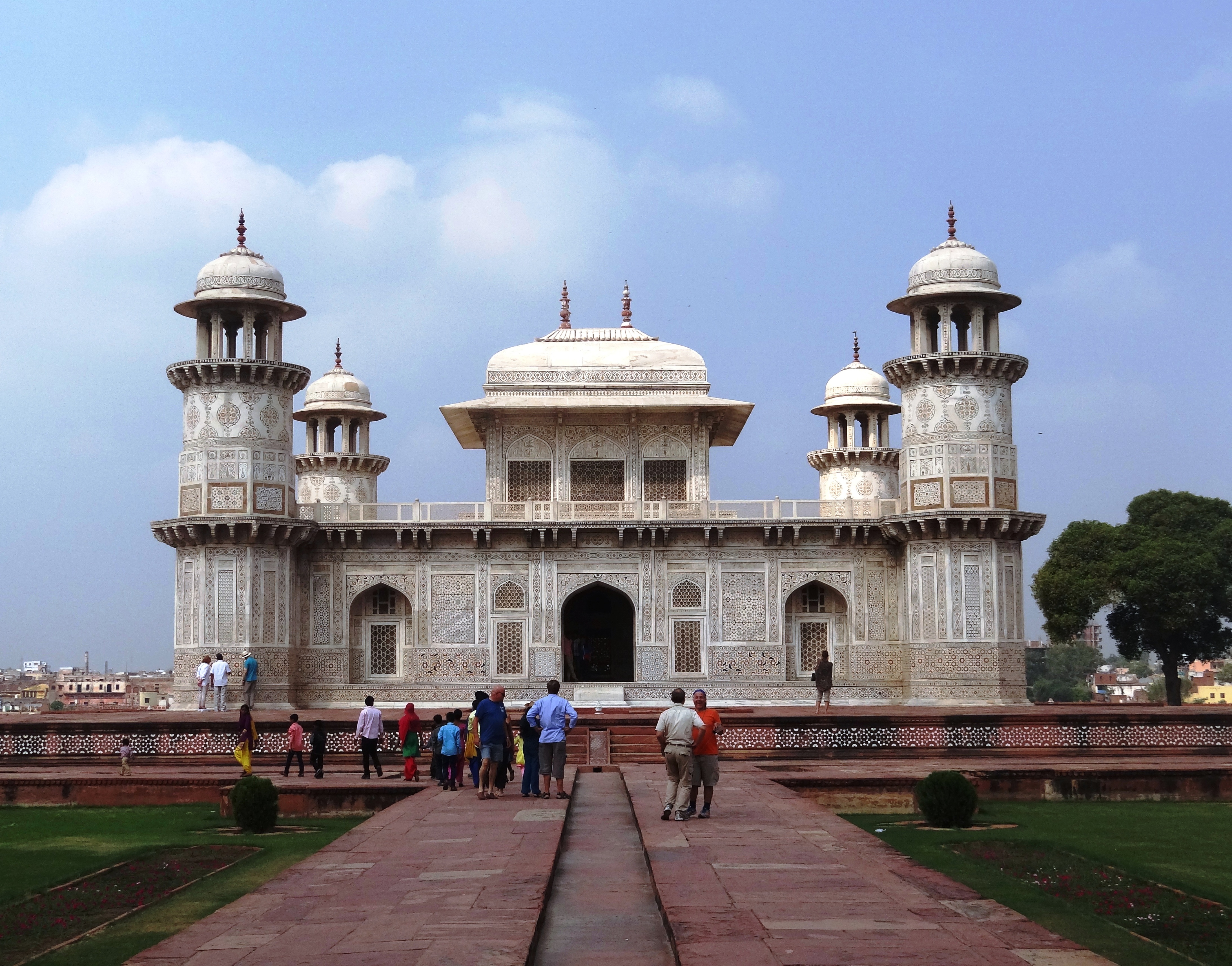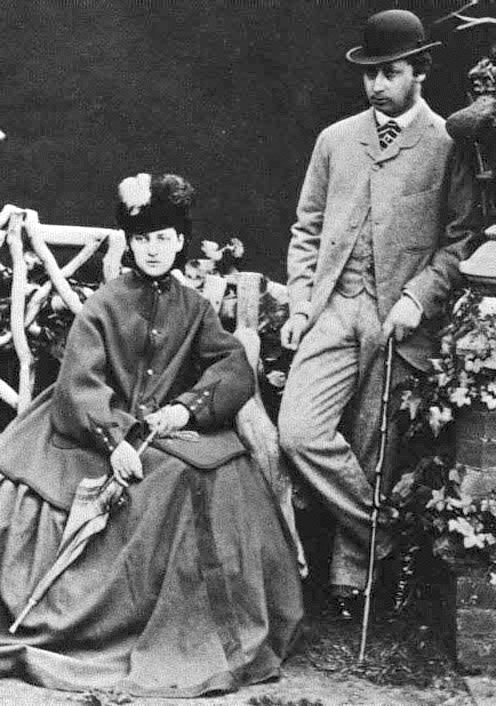|
Hoshiyar Qadin
Hoshiyar Qadin (; died 21 June 1886) was a consort to Ibrahim Pasha and was Walida Pasha to their son Isma'il Pasha. Early life Of Circassian or European origin, Hoshiyar Qadin was in good relationship with Pertevniyal Sultan, the mother of Ottoman Sultan Abdulaziz. Ibrahim had known Istanbul, since he was a hostage in the imperial capital 1806–1807. He may have met and fell in love with Hoshiyar later in Bebek. She was brought to the harem of the Muhammad Ali dynasty and married Ibrahim Pasha, and gave birth to Isma'il Pasha on 31 December 1830. After the death of Sa'id Pasha, Isma'il was proclaimed Khedive on 19 January 1863, though the Ottoman Empire and the other Great Powers recognized him only as Wāli, and Hoshiyar became the Walida Pasha. As Walida Pasha Hoshiyar Qadin was a public figure whose doings were continually reported by the press, which referred to her simply as Queen Mother. During the 'Urabi revolt her patriotic feelings made her accept 'Urabi as the def ... [...More Info...] [...Related Items...] OR: [Wikipedia] [Google] [Baidu] |
Egypt
Egypt ( , ), officially the Arab Republic of Egypt, is a country spanning the Northeast Africa, northeast corner of Africa and Western Asia, southwest corner of Asia via the Sinai Peninsula. It is bordered by the Mediterranean Sea to northern coast of Egypt, the north, the Gaza Strip of Palestine and Israel to Egypt–Israel barrier, the northeast, the Red Sea to the east, Sudan to Egypt–Sudan border, the south, and Libya to Egypt–Libya border, the west; the Gulf of Aqaba in the northeast separates Egypt from Jordan and Saudi Arabia. Cairo is the capital, list of cities and towns in Egypt, largest city, and leading cultural center, while Alexandria is the second-largest city and an important hub of industry and tourism. With over 109 million inhabitants, Egypt is the List of African countries by population, third-most populous country in Africa and List of countries and dependencies by population, 15th-most populated in the world. Egypt has one of the longest histories o ... [...More Info...] [...Related Items...] OR: [Wikipedia] [Google] [Baidu] |
'Urabi Revolt
The ʻUrabi revolt, also known as the ʻUrabi Revolution (), was a nationalist uprising in the Khedivate of Egypt from 1879 to 1882. It was led by and named for Colonel Ahmed Urabi and sought to depose the khedive, Tewfik Pasha, and end Imperial British and French influence over the country. The uprising was ended by the Anglo-Egyptian War and the British takeover of the country, beginning the history of Egypt under the British. Prologue Egypt in the 1870s was under foreign influence, corruption, misgovernment, and in a state of financial ruin. Huge debts rung up by its ruler Ismaʻil Pasha could no longer be repaid, and under pressure from the European banks that held the debt, the country's finances were being controlled by representatives of France and Britain via the Caisse de la Dette Publique. When Ismaʻil tried to rouse the Egyptian people against this foreign intervention, he was deposed by the British and replaced by his more pliable son Tewfik Pasha. The upp ... [...More Info...] [...Related Items...] OR: [Wikipedia] [Google] [Baidu] |
List Of Kidnappings
The following is a list of kidnappings summarizing the events of each case, including instances of celebrity abductions, claimed hoaxes, suspected kidnappings, extradition abductions, and mass kidnappings. By date * List of kidnappings before 1900 * List of kidnappings: 1900–1949 * List of kidnappings: 1950–1979 * List of kidnappings: 1980–1989 * List of kidnappings: 1990–1999 * List of kidnappings: 2000–2009 * List of kidnappings: 2010–2019 * List of kidnappings: 2020–present Modern kidnappings of celebrities or their relatives Kidnappers interested in getting a large ransom or a political effect often target celebrities or their relatives. Here are some of the people affected by these crimes: * Mordechai Oren was a Jewish politician who was taken hostage in Czechoslovakia during the Cold War in 1951 and sentenced to 15 years in prison, before being released. * Leon Ames: Film and television actor who, together with his wife, was held hostage at thei ... [...More Info...] [...Related Items...] OR: [Wikipedia] [Google] [Baidu] |
Yousra
Yousra ( ; , ; born Sivin Nesim (. ) is an Egyptians, Egyptian actress and singer. She is considered as a glamorous icon for the Middle East and is an influential voice in the region. Career Yousra participated as a main Role actress in almost 81 films, 20 Drama Serials and 3 Live theater performances. She first appeared in the 1980 film ''Athkiya' Laken Aghbiya (Smart yet Stupid)''. Then she played many roles with varying looks – the naughty, quiet, docile, or impish. Yousra participated in comedy, drama, and entertainment. ''Kasr Fi El Hawaa (Castle In the Air)'' by Abdel Halim Nasr in 1980. ''Fatah Tabhath Ann Alhob (A Girl Looking for Love)'' by Nader Galal in 1977. ''Alf Bossa Wa Bossa (A Thousand and One Kisses)'' by Mohamed Abdel Aziz in 1977. ''Ebtessama Waheda Takfi (One Smile is Enough)'' by Mohamed Bassiyouni in 1978, to mention just a few. These were followed by a number of successful films with Adel Emam such as: ''Shabab Yarkoss Fawk Alnar (Youth Dancing on Fir ... [...More Info...] [...Related Items...] OR: [Wikipedia] [Google] [Baidu] |
Saraya Abdeen
Saraya Abdeen () is an Egyptian historical TV drama series, The first season was aired on MBC on 29 June 2014, written by Kuwaiti author Heba Meshari Hamada, directed by Amr Arafa, produced by Mahmood Shokri, and starring Qusai Khouli, Yousra, Nour, May Kassab, Ghada Adel and Nelly Karim. A second season was released in April 2015 which was directed by Shadi Abu Al-Oyoun Al-Soud. Plot The series focuses on life of Ismail Pasha who was the Khedive of Egypt and Sudan from 1863 to 1879, with his wives and concubines and their Intrigues on each other with their servants and slaves. Cast * Qusai Khouli as Isma'il Pasha * Yousra as Hoshiyar Qadin * Nour as Ferial Qadin * Nelly Karim as Princess Safinaz and her twin sister Julnar * May Kassab as Shafaq Nur Hanim * Ghada Adel as Concubine Shams Qadin * Reem Mustafa as Concubine Shams Qadin (2nd season) * Sawsan Arsheed as Jeshm Afet Hanim * Alaa Mursi as Sulayman * Dalia Mostafa as Narges * Carmen Lebbos as Nazli * ... [...More Info...] [...Related Items...] OR: [Wikipedia] [Google] [Baidu] |
Laila Fawzi
Laila Fawzi (; 1923 - January 12, 2005), also spelt Leila Fawzi and Layla Fawzy, was an Egyptian actress, model and beauty pageant titleholder. She was one of the pioneers of Egyptian cinema and starred in over 85 films throughout her career. In 1940, she was crowned Miss Egypt. Personal life Fawzi was born in Turkey to an Egyptian father and a Turkish mother. Her father owned fabric stores in Cairo, Damascus and Istanbul. She won the Miss Egypt contest in 1940 and was awarded a small role in the Egyptian movie ''Wives Factory'' in 1941. She married three times; first to fellow Egyptian actor Aziz Osman, followed by actor Anwar Wagdi Anwar Wagdi (, ; 11 October 1904 – 14 May 1955), born Anwar Wagdi Yehia Elfattal, was an Egyptians, Egyptian actor, screenwriter, Film director, director and Film producer, producer. Life Anwar was born in the Cairo district of Daher, Egypt, ..., and then television presenter Galal Moawad. Death Fawzi died on January 12, 2005. Reference ... [...More Info...] [...Related Items...] OR: [Wikipedia] [Google] [Baidu] |
Order Of Charity
The Order of Charity (), sometimes referred to as the Order of the Chefakat, was an order of the Ottoman Empire founded in 1878 by Sultan Abdul Hamid II. It was bestowed on selected women for distinguished humanitarian or charitable works, or as a token of the Sultan's esteem. Recipients included non-Ottoman citizens, including the English painter Margaret Murray Cookesley for her portrait of the Sultan's son, Hariot Hamilton-Temple-Blackwood (1883), wife of the Earl of Dufferin who was British ambassador to the Ottoman Empire, and to American social reformer Ellen Martin Henrotin (1893). The badge consists of a five pointed star in gold and crimson enamel, with a central gold medallion bearing the Sultan's cypher, surrounded by a green enamelled band with the words "Humanity, Assistance, Patriotism" in Ottoman Turkish. The star rests upon a circular wreath enamelled green with crimson berries, the whole mounted on another star with radiant points. The decoration is hung from ... [...More Info...] [...Related Items...] OR: [Wikipedia] [Google] [Baidu] |
Order Of Osmanieh
The Order of Osmanieh (, Modern ) was a civil and military decoration of the Ottoman Empire. History The order was created in January 1862 by Sultan Abdülaziz. With the obsolescence of the Nişan-i Iftikhar, this became the second highest order in the Empire, ranking below the Nişan-i Imtiyaz. It was awarded by the Sultan to Ottoman civil servants and military leaders for outstanding services to the state. Generally, it could not be awarded to women, but exceptions appear to have been made at the Sultan's discretion. The order was originally established in three classes. In 1867 the order was expanded to four classes, plus an augmented first class set with brilliants or diamonds (This does not include the awards with sabers, which were not separate classes, but did constitute separate awards). The order was restricted (for Turkish recipients) to 50 members of the first class, 200 members of the second class, 1000 of the third class, and 2000 of the fourth class. Originally, o ... [...More Info...] [...Related Items...] OR: [Wikipedia] [Google] [Baidu] |
Tomb Of Khushiyar Kadin
A tomb ( ''tumbos'') or sepulchre () is a repository for the remains of the dead. It is generally any structurally enclosed interment space or burial chamber, of varying sizes. Placing a corpse into a tomb can be called ''immurement'', although this word mainly means entombing people alive, and is a method of final disposition, as an alternative to cremation or burial. Overview The word is used in a broad sense to encompass a number of such types of places of interment or, occasionally, burial, including: * Architectural shrines – in Christianity, an architectural shrine above a saint's first place of burial, as opposed to a similar shrine on which stands a reliquary or feretory into which the saint's remains have been transferred * Burial vault – a stone or brick-lined underground space for multiple burials, originally vaulted, often privately owned for specific family groups; usually beneath a religious building such as a * Church * Cemetery * Churchyard * Cat ... [...More Info...] [...Related Items...] OR: [Wikipedia] [Google] [Baidu] |
Edward VII
Edward VII (Albert Edward; 9 November 1841 – 6 May 1910) was King of the United Kingdom and the British Dominions, and Emperor of India, from 22 January 1901 until Death and state funeral of Edward VII, his death in 1910. The second child and eldest son of Queen Victoria and Prince Albert of Saxe-Coburg and Gotha, Edward, nicknamed "Bertie", was related to royalty throughout Europe. He was Prince of Wales and heir apparent to the British throne for almost 60 years. During his mother's reign, he was largely excluded from political influence and came to personify the fashionable, leisured elite. He Wedding of Prince Albert Edward and Princess Alexandra, married Princess Alexandra of Denmark in 1863, and the couple had six children. As Prince of Wales, Edward travelled throughout Britain performing ceremonial public duties and represented Britain on visits abroad. His tours of North America in 1860 and of the Indian subcontinent in 1875 proved popular successes. Despite the ap ... [...More Info...] [...Related Items...] OR: [Wikipedia] [Google] [Baidu] |





